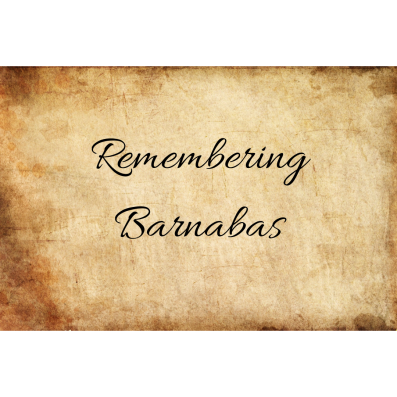
25 April 2023
Remembering Barnabas

25 April 2023
Remembering Barnabas
I have a heart for neglected biblical figures, and Joseph, nicknamed Barnabas, probably fits the bill. Most of what we know about Barnabas comes from the book of Acts, although there are two references to Barnabas in Paul’s letters, one cutting and one positive. But why reflections on Barnabas around the time of the festival for St Mark? Well, one of the things for which Barnabas is remembered is that he stood up for John, also known as Mark, traditionally credited for Mark’s Gospel. (And if you want some thoughts about Mark’s Gospel, check out Amy Erickson’s previous blogpost entitled ‘After Easter’.)
Why remember Barnabas? First, he was a risk-taker for the common good. This is brought out by Luke in his introduction of Barnabas at the end of Acts 5, where he serves as the positive counterpart to the dishonest partners, Ananias and Sapphira. He put all his funds at the apostles’ disposal—for the common good. He was also a risk-taker for the common good when he recognized in Paul, a former enemy of the church, one who might well have something to offer the wider community of faith. He commends Paul to the apostles—for the common good.
Barnabas is also the person the mother church in Jerusalem sends to oversee the growing church in Antioch, and it is at this point that Luke describes Barnabas as ‘a good man, full of the Holy Spirit and of faith’. Once again, Barnabas is instrumental in bringing Paul to prominence in the early church’s growth, for we are told that he hunts Paul down in his hometown of Tarsus to bring him back to Antioch. Barnabas continues to take risk-taking initiatives for the common good. One could say that from this point on the rest is history, but that would be to gloss over some interesting twists in the story of Barnabas.
Luke doesn’t headline this, but the way in which his story unfolds indicates that over time Barnabas relinquishes his leadership role in favour of Paul. Subtly, Barnabas moves from instigator and initiator to companion. This he seems to take in his stride, and I am impressed by his capacity to be big enough to step aside. It takes more than being a good man, full of the Holy Spirit and faith, to allow someone else’s light to shine more brightly than one’s own, especially when that someone is so indebted, beholden… It takes maturity and a profound sense of security in oneself to decrease so that another might increase.
At the end of Acts 15 Paul says, ‘Come on, Barnabas, it’s time to retrace our mission steps.’ ‘What about John Mark?’ Barnabas asks. Paul cuts John Mark loose because of his earlier ‘desertion’ (Acts 13:13), but Barnabas is willing to give John Mark a second chance. He was committed to the ‘church of the second chance’, as Anne Tyler called it in Saint Maybe. Some are inclined to see this disagreement as more a consequence than the cause of the parting of the ways between Barnabas and Paul, but Barnabas had the strength not only to step aside to let Paul have the limelight but also to stand up to Paul when he saw the need. We don’t have his side of the story about the kerfuffle in Antioch, only Paul’s in Galatians 2, but we shouldn’t assume that the only perspective we have on this event is the only legitimate one. Paul’s remark about Barnabas in 1 Corinthians 9:6 suggests he still had time for Barnabas, and if this remark indicates that the rift between them had been bridged, which of the two do you think was likely responsible for first extending the hand of reconciliation?
—David Neville
© 2025 St Mark’s National Theological Centre
A PARTNER IN THE SCHOOL OF THEOLOGY AT
Charles Sturt University, CRICOS Provider: 00005F, TEQSA Provider Identification: PRV12018 (Australian university)
Contact | Privacy | Safety | Disclaimer | Copyright | Accessibility | Shipping